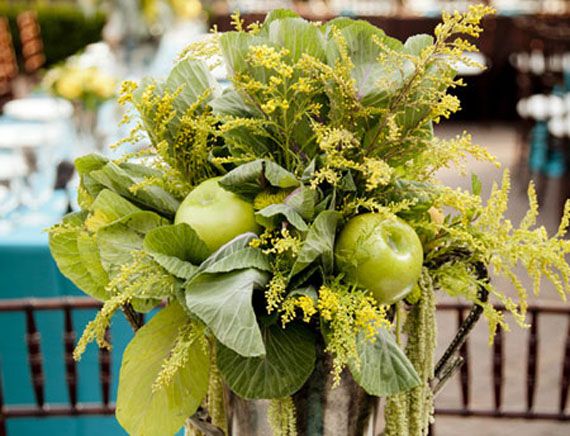
Photo Credit: Sebrell Smith Designer Events
We’re not going to argue — at Thanksgiving, the star of the show is more often than not the turkey. After all, weighing in around 13-20 pounds, the beast is a force to be reckoned with — especially when you’ve been laboring over it all day. Turkey, stuffing, creamed onions, and cranberry sauce aside, though, adding a little color and seasonal flair to the table is just as important as getting the food on the table.
 When thinking about an arrangement or centerpiece of sorts for the table, most think of elaborate (and expensive) flowers — but that doesn’t have to be the case. For a longer-lasting arrangement, and to save money, consider what natural elements are available outside for the picking. “Fall fruits and vegetables are easy and inexpensive to incorporate,” says Sayles Livingston, the owner of Sayles Livingston Flowers in Tiverton, R.I., who uses autumnal tones to invoke a feeling of warmth when creating arrangements in the fall.
When thinking about an arrangement or centerpiece of sorts for the table, most think of elaborate (and expensive) flowers — but that doesn’t have to be the case. For a longer-lasting arrangement, and to save money, consider what natural elements are available outside for the picking. “Fall fruits and vegetables are easy and inexpensive to incorporate,” says Sayles Livingston, the owner of Sayles Livingston Flowers in Tiverton, R.I., who uses autumnal tones to invoke a feeling of warmth when creating arrangements in the fall.
For those living in cities, she suggests heading to your local supermarket to choose produce like artichokes, apples, pears, gourds, grapes, and squash when decorating the table. For Sebrell Smith of Sebrell Smith Designer Events in Savannah, Ga., hearty winter greens like kale and collards are a must — she uses these materials next to white roses and Granny Smith apples in an arrangement. (Photo courtesy of Sayles Livingston Flowers)
Even a winter herb like rosemary is fair game to soften an otherwise sleek, modern look. And don’t forget the wild berries, like hypericum and snowberry. They are “the epitome of fall,” says Livingston, and come in a wide range of colors that, she thinks, symbolize the changing of the seasons more than any other floral component.
Click here to see the 11 Unique Ideas for Thanksgiving Centerpieces Slideshow
Bella Meyer of New York City’s FleursBella, finds that these same contrasting autumnal colors guide her designs, in addition to “the falling leaves, the crystal clear light following a sudden rainfall, the dark clouds offsetting the bright white sunshine, deep brown and black accents contrasting with soft gold fields.” In her work, natural materials like autumn leaves, pods and seeds, and multitudes of grasses and vines like bittersweet predominate. “I then like to counteract all these fine textures with the bold and lush shapes of the harvest, like grapes, persimmons, pomegranates, and squash.”
 Once you’ve selected your color palette for your Thanksgiving table, decide on how you want the flowers to be arranged. For Mayer, one of the easiest centerpieces is all natural. Begin with fall leaves, spilled on the center of the table, in the center. “Arrange various seasonal fruit and gourds, pods and seeds, in a random fashion, on top.”
Once you’ve selected your color palette for your Thanksgiving table, decide on how you want the flowers to be arranged. For Mayer, one of the easiest centerpieces is all natural. Begin with fall leaves, spilled on the center of the table, in the center. “Arrange various seasonal fruit and gourds, pods and seeds, in a random fashion, on top.”
Smith sometimes uses large pumpkins instead of vases in the fall, hollowing out the middle to create a water-tight vessel into which a frog or water-soaked oasis can be placed. Mini pumpkins work well, too, and are fun to use as place card holders.
Just be sure that the size of your arrangement(s) is in alignment with the space needs of the table, cautions Livingston. “If you plan on a good deal of passing of food platters, wine, bread, etc., it is generally better to make multiple, smaller arrangements which can be moved around to fit these transitory platters and bottles.” Mayer agrees, even when setting a large, long table. Keep it narrow and low, not more than 12 inches. It can be built with several small containers, or you can find a low and long vessel to play with, and have the materials overflowing on all sides.” (Photo courtesy of Sebrell Smith Designer Events)
Last, but certainly not least, the finishing touch should be candles. In any size, shape, and container, candles should always be incorporated for a warm glow.
More from our friends over at TheDailyMeal:
- Money-Saving Tips for Hosting Holiday Parties
- 14 Party Essentials Everyone Should Have
- 14 Best Party-Planning Apps
- Save Money On Your Wedding Wine List









